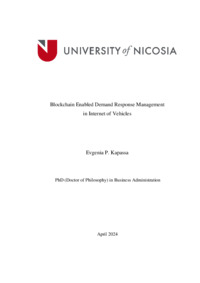-
This dissertation investigates the integration of blockchain technology within the domain of Demand Response Management (DRM) in the Internet of Vehicles (IoV). The study is driven by the increasing integration of Electric Vehicles (EVs) into the energy ecosystem and a growing emphasis on decentralized energy resources. The aim of this study is to investigate the use of blockchain, as a technology for enhancing DRM in the IoV, addressing challenges related to energy management and secure data handling. Electric vehicles have potential as decentralized energy storage systems, yet there are ongoing issues to be addressed, including DRM, managing the equilibrium of energy supply and coordinating the charging process. Centralized charging systems, currently in use, are limited in effectiveness and raise concerns about transparency and privacy. Blockchain technology emerges as a potential solution for these issues, yet its application in real-world IoV settings for privacy preservation and incentivizing participation is underexplored. Additionally, there is a notable absence of personalized EV charging strategies in existing studies, highlighting the need for empirical research on the effectiveness of blockchain-based DRM and personalized charging approaches in the IoV context. To bridge this gap, a novel blockchain-based conceptual model for DRM in IoV is proposed. This model emphasizes tokenized incentives, user-centric profiles, adaptive charging schedules, bi-directional Peer-to-Peer (P2P) energy trading and privacy through blockchain capabilities. The research adopts an interpretivist stance and a qualitative methodological approach, utilizing a multiple case study strategy to evaluate the proposed model. Four case studies, including organizations from both the academic and the industry area, provide rich empirical data. While the empirical evidence supports the conceptual validity of the proposed model, it also reveals recommendations for further enhancement. Therefore, the proposed conceptual model is refined based on the empirical findings. This research makes significant advancements, introducing a novel Blockchain-Enabled DRM Model for IoV, addressing key challenges in the field. This model is distinguished by its holistic approach, combining tokenized incentives, bi-directional P2P energy trading and user-centric profiles. The incorporation of blockchain not only enhances data security and transparency but also introduces a novel approach to incentivizing user participation through tokenized rewards. The model’s emphasis on personalized EV charging strategies, based on user profiles, represents a significant leap in aligning DRM with individual user needs and behaviours. Additionally, the research introduces user-centric and blockchain-enabled DRM strategies. By centring the DRM process around the user, the study addresses a crucial gap in existing literature. Finally, the thesis incorporates environmental considerations into the DRM model, a novel aspect of the study. It addresses the energy consumption associated with blockchain technology and integrates renewable energy sources, aligning DRM practices with environmental sustainability goals. In summary, this thesis extends the body of knowledge and contributes to the progress of blockchain technology in the context of IoV DRM, through a novel model development, empirical validation, user-centric approaches, and sustainability considerations.
Blockchain Enabled Demand Response Management in Internet of Vehicles
- PhD thesis
- english
-
- Blockchain -- Internet of Vehicles (IoV)
- Blockchain -- Data privacy



